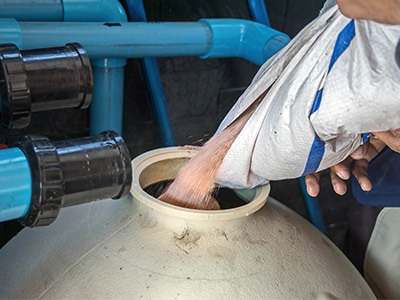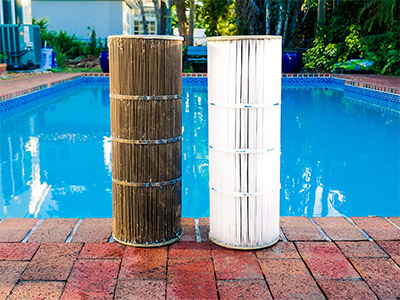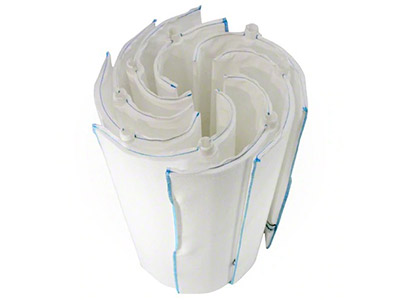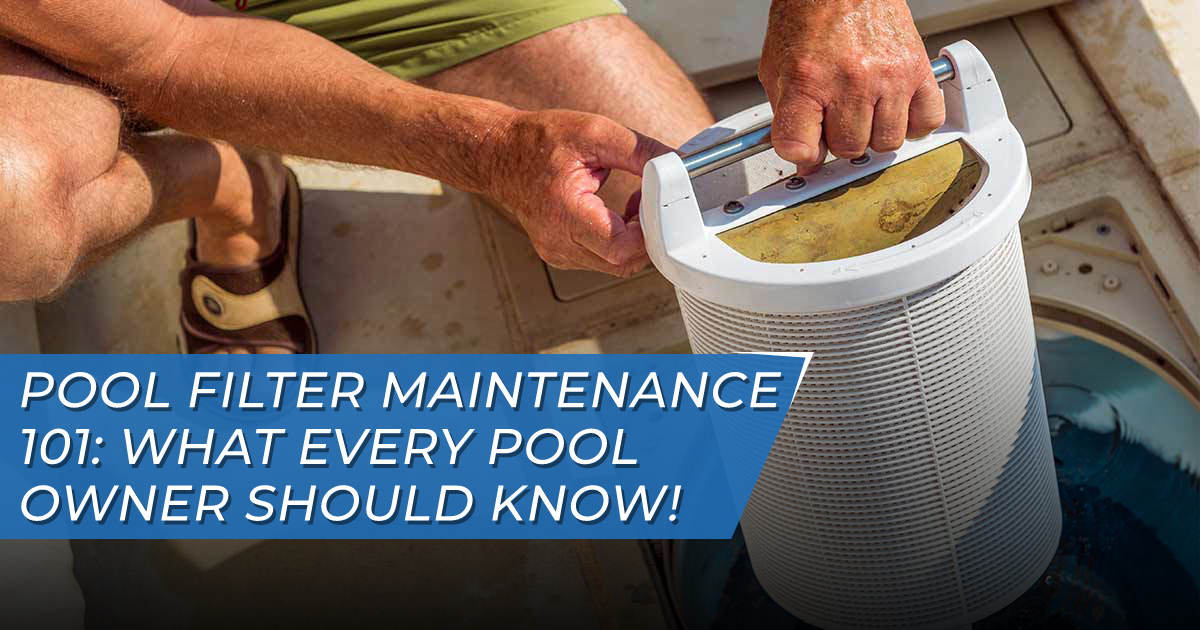Pool Filter Maintenance 101: What Every Pool Owner Should Know!
Your pool filter basically does all the dirty work for you, so it needs all the attention it can get to make your swimming pool debris-free. Whether you are a first-time pool owner or not, our guide to pool filter maintenance can keep your pool from being a breeding ground for dirt and bacteria.
Related Article: Pool Filter Types: Why You Should Know the Differences
Pool Filter Maintenance
Sand Pool Filters
 A sand filter tank, which is made up of metal, concrete, or fiberglass, consists of a bed of specialized sand that traps debris and dirt. A sand filter offers a cheap and efficient way to clean in-ground and above-ground pools.
A sand filter tank, which is made up of metal, concrete, or fiberglass, consists of a bed of specialized sand that traps debris and dirt. A sand filter offers a cheap and efficient way to clean in-ground and above-ground pools.
How it works: During the filtration process, the pool water runs through the tank’s inlet pipe, which is then distributed to the tank’s head. The special-grade sand picks up all the dirt and debris from the water. The filtered water is then released back into the pool through the system’s pick-up unit and outlet pipe.
When to clean it: Sand filters typically come with an outlet and inlet pressure gauge, which help you determine your filter’s blockage level. As a rule of thumb, the pressure in your inlet pipe should be lower than the pressure in your outlet pipe.
As a clearer (and more accurate) guide, a clean sand filter’s pressure differential ranges between 3-5 psi. Once the sand filter becomes clogged with dirt, the pressure differential will continuously rise until it reaches around 16 psi, which basically tells you that you need to clean your filter. If your system only has an inlet pressure gauge, monitor the pressure differential until it peaks at 8-10 psi.
Basic cleaning tips: Backwashing your sand filter can help you get the most out of your system. You can start by turning off the pump and setting the pool filter valve into its “backwash” mode. Close your return pipe and open your drainage pipe so you can successfully redirect the debris to your sewer system. During so, the pump’s pipe should be connected to the outlet pipe, while the drainage pipe is linked to the inlet pipe. Once the pipes are ready, turn the power on and let it run for about 2 minutes. Check the water’s consistency and clarity through the sight glass valve. As the pump runs, the color of the water should change from cloudy to clear.
Cartridge Pool Filters
 A cartridge filter takes debris out by the use of corrugated paper or polyester cloth, which is placed inside a filter housing system. Ideally used in spas and above-ground pools, this kind of filtration system works best at purifying water with contaminant levels that do not exceed 100 ppm (parts per million). A cartridge filter allows for easier maintenance and less back pressure. However, it is not as efficient in filtering hard water as compared to other filters.
A cartridge filter takes debris out by the use of corrugated paper or polyester cloth, which is placed inside a filter housing system. Ideally used in spas and above-ground pools, this kind of filtration system works best at purifying water with contaminant levels that do not exceed 100 ppm (parts per million). A cartridge filter allows for easier maintenance and less back pressure. However, it is not as efficient in filtering hard water as compared to other filters.
How it works: Cartridge filters have a simple working mechanism. As pool water is pushed towards the tank, the water passes through the system’s skimmer, which filters large debris. The secondary basket catches the smaller dirt particles before the water runs through the polyester filter. The cloth collects the remaining dirt, allowing for clean water to get through the system.
When to clean it: Effective swimming pool filter maintenance starts with learning to identify when you need to clean your filter. In this case, the size of your cartridge filter determines how often you need to clean or replace your filter. Monitor your system by checking your pressure gauge. If it rises to about 8 to 10 psi, you need to get your cleaning tools ready.
Basic cleaning tips: A cartridge filter doesn’t require backwashing. To clean the filter, simply turn off the pump, remove the system’s filter and hose off the debris. You may also use a filter cleaner to remove small impurities.
Diatomaceous Earth Pool Filters
 Think it’s impossible to filter out microscopic dirt with fine powder? Think again! A diatomaceous earth filter (DE filter), which is the most effective filtering agent used for pools, is made from pulverizing fossilized remains of diatoms (ancient algae-like organisms). While it may be more expensive than other types of filters, it is definitely worth more than its price as it can filter particles that are about 3-5 microns, which is invisible to the naked eye.
Think it’s impossible to filter out microscopic dirt with fine powder? Think again! A diatomaceous earth filter (DE filter), which is the most effective filtering agent used for pools, is made from pulverizing fossilized remains of diatoms (ancient algae-like organisms). While it may be more expensive than other types of filters, it is definitely worth more than its price as it can filter particles that are about 3-5 microns, which is invisible to the naked eye.
How it works: DE filters are powdery substances that practically act as your pool’s main filter. When placed under a microscope, DE is composed of sponge-like organisms that absorb the tiniest water impurities. Once DE is added into the skimmer, it is dissolved inside the pipe as it goes through the filter tank and the grid. It then coats the filter grids, which are covered with fabric. The fabric prevents the DE from being released into the pool. The dirty water from the pool is filtered by the DE, which collects and traps microscopic water impurities.
When to clean it: Just like other filtration systems, DE filters can be monitored by the use of a pressure gauge. When the meter reads around 8 psi higher than the system’s start-up pressure, you need to backwash the system and check the grid for proper swimming pool filter maintenance.
Basic cleaning tips: Cleaning a DE filter bears similarities with maintaining a sand filter, except that you need to pour new DE powder into your skimmer after backwashing your system.
Related Article: How to Clean a Pool Filter the Right Way
Need Help With Your Swimming Pool Filter Maintenance?
Indeed, owning a pool is not all glitz and glamour, especially when you think about the dirty work behind keeping your pool debris-free. But with regular maintenance, you can transform your pool into your very own zen zone, minus the dirt and the bacteria. If you need help with pool cleaning & maintenance or with anything pool-related, don’t hesitate to contact us. We have locations in New Tampa, Lutz, and Land O’ Lakes that have been serving our neighbors in Wesley Chapel, Pebble Creek, Tampa Palms, Odessa, Seven Springs, Lake Fern, and others, for over 25 years!

